The Northern Weekly Salvo
Incorporating Slaithwaite Review of Books, Weekly Notices, Sectional Appendices, Tunnel Gazers’ Gazette and Northern Umbrella. Descendant of Teddy Ashton’s Northern Weekly and Th’Bowtun Loominary.
Published at 109 Harpers Lane Bolton BL1 6HU email: paul.salveson@myphone.coop
Publications website: www.lancashireloominary.co.uk
No. 293 May 10th 2021
Salveson’s half-nakedly political digest of railwayness, tripe and secessionist nonsense from Up North. Sometimes weekly, usually not; definitely Northern. Read by the highest and lowest officers of state, Whitmanites, weirdos, misfits, steam punks, yes women, no men, gay Swedenborgians, cat-spotters, discerning sybarites, bi-guys, non-aligned social democrats, pie-eaters, tripe dressers, nail artists, self-managing VIMTO drinkers, truculent Northerners, grumpy Norwegians, absurd Marxists, sleepy Hungarians, members of the clergy and the toiling masses, generally. All views expressed are my own and usually nobody else’s. Official journal of the Station Cat Improvement Network, Pacer Dining Club, Station Buffet Acceleration Council and the Campaign for a North with a capital ‘N’.
“We are far more united and have far more in common with each other than things that divide us.” – Jo Cox, maiden speech in House of Commons, June 3rd 2015
General gossips
We live in interesting times all right, and challenging ones. The election results across England, Scotland and Wales send so many different messages, though none of them are particularly good ones for Keir Starmer.
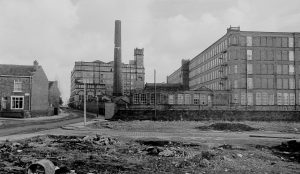
He should go. His sacking of Angela Rayner was mean-minded and counter-productive (though now being spun as just a change in jobs). She is the sacrificial lamb for Starmer’s own failings as a leader. When many are saying that Labour has lost trust with the Northern working class, Starmer responds by dumping the most high profile Northern, working class woman in his shadow cabinet. I feel very, very angry. I’m not saying this from a knee-jerk leftist position, scorning ‘Blairite’ Starmer. We need a bit more ‘Blairism’ if it means Labour can win, but it needs a vision that meets the needs of today, not 1945, and not the 1990s. We need to move on from these silly ‘Blairite’ insults which mean nothing to people outside the Left.
The areas where Labour did well were no thanks to Starmer – above all Mark Drakeford’s Welsh Labour, Andy Burnham in Greater Manchester and the mayors in Liverpool City Region, West Yorkshire and London.
While the two regional parties standing in Hartlepool didn’t make an impact, Bob Buxton of the Yorkshire Party came third in the West Yorkshire mayoral elections with a very respectable 58,851 votes. Mick Bower, standing in Sheffield City Region elections, came third with an even higher percentage vote. The North-East party won four seats on Durham County Council and 17 out of 22 seats on Peterlee Town Council.
In this issue of The Salvo I reflect at greater length on a possible solution to Labour’s ‘Northern Question’. I argue that the solution doesn’t lie with a bit of re-branding, nor even a new national leader (though we certainly need one) – but a radically devolved ‘Northern Labour’ which can develop its own identity and its own policies that can win back support. Apologies to non-Labour readers, but there is a good argument for democracy as a whole which says we need a strong opposition. One other point – Labour didn’t do badly because it was too ‘right-wing’. I don’t think people really knew what wing it was, but retreating to a comfortable Corbynite world isn’t going to solve anything.
By Pendle Hill at Clarion House
A very good place to go and reflect on current politics is the wonderful Clarion House, on the side of Pendle, up above the former textile powerhouses of Burnley and Nelson. It was set up by the Independent Labour Party over a century ago and its full name is Nelson ILP Clarion House.
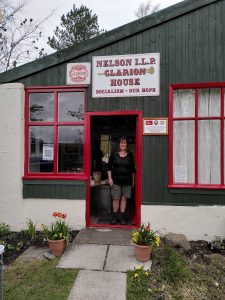
The ‘Clarion’ was the socialist newspaper run by Robert Blatchford in the 1890s which spawned lots of spin-offs, above all the Clarion Cycling Club, which is still very much alive today with sections across the country. There were several ‘Clarion Houses’, mostly in Lancashire, Yorkshire and Cheshire where cyclists and walkers could visit at the weekend. The Nelson house is the last of a long heroic line. Although not open for inside catering you can get a mug of tea and a Mars bar and sit outside on the comfortable picnic tables. It was good to see the ‘memorial bench’ for Denis Pye who loved this place, and we enjoyed some demanding back rides to the tea rooms back in the 1980s. Clarion House is one of the very last physical reminders of that ethical socialism which swept the North of England in the 1890s and early 1900s.
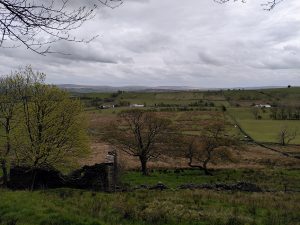
Inside, there are pictures of the early Labour leaders like Keir Hardie as well as local heroes and heroines like Selina Cooper who helped forge Nelson into a centre of socialist politics and culture. The philosophy of that ‘socialism with a Northern accent’ was summed up in the words of William Morris ‘Fellowship is Life’. That reminds as true as ever, and the early ILP’s linkage of region, class and community has a lot to offer the modern day Labour movement. Clarion House will be fully open from May 23rd, on Sundays. It is well worth a trip – and enjoy a walk around Pendle while you’re here. Maybe Keir Starmer might like to visit.
Taking us to Rivington
An equally delightful place to Pendle is Rivington. It doesn’t have a socialist tea room though the Villege Green’s cafe, in the former Unitarian church hall, comes near.
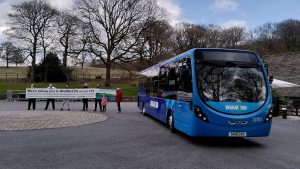
It gets thousands of visitors (even over the last year) but it is decades since it has had a bus service. Thanks to South-East Lancashire Community Rail Partnership, with funding from Community Rail Network, Cross Country Trains and Horwich Town Council, it now does. It operates every Sunday and Bank Holiday, running as an extension to the half-hourly 575 from Bolton to Horwich, operated by Diamond Buses NW (part of Rotala). The CRP is exploring other possibilities in neighbouring areas for integrated rail/bus links.
Welsh lessons for Northern Labour
I’m writing this from the perspective of the North of England, and my particular place in it – Bolton. The results within the region, but also in other parts of the UK, have some important messages for progressive politics in the North. A number of things are clear:
- Labour in Wales has done remarkably well
- The SNP has consolidated its position and Labour in Scotland has not made its hoped-for breakthrough under its new leader
- Labour in many English towns and cities has done badly, contradicted to a degree by its performance in some cities – for example London, Manchester, Liverpool
- Small, in some cases ‘hyper-local’ parties have done very well in certain areas where the incumbent party (usually Labour) is seen as ineffective
- The small English regional parties have struggled to make a breakthrough, with poor results in Hartlepool but localised succeses in Co. Durham and a good vote in the West Yorkshire mayoral elections
- The Green Party has made modest progress in places where it has put in consistent local campaigning (but by no means everywhere)
The main focus of this short paper is on why Labour did so well in Wales and why it has struggled in the North of England outside the mets (and even there the picture is complicated); with some lessons for Labour in the North. In some ways, the two places are very different: Wales is a nation with its own history and culture, including language. The North of England is (at least) three regions, with identities revolving round locality and historic counties, such as Yorkshire and Lancashire.
However, there are some similarities between Wales and the North of England, particularly in the traditionally working class former industrial areas: the Valleys in particular, but also the former mining and steel-making areas around Wrexham and North Wales. Whilst these areas voted strongly for ‘Brexit’ it has not stopped them, by and large, for remaining with Labour in the Assembly elections. The pattern in similar ‘left-behind’ areas in the North of England has been very different, with swings to either the Tories or ‘hyper-local’ parties in towns such as Bolton, Oldham and Bury.
The political pundits have put forward a number of suggestions for why Welsh Labour has done so well. These include the ‘incumbency’ factor and the competent way in which the Labour-run Welsh Government has handled Covid. There is also the historic hatred of the Conservatives in many parts of Wales.
But maybe there is something else – that Labour in Wales did not present itself as a sort of ‘local’ version of Starmer’s Labour, but something distinctly ‘Welsh’. Proud of the nation and its heritage, but not aggressively ‘nationalistic’ in a way that might have scared some people – including the large number of English ex-pats in many parts of the country. ‘Welsh Labour’ was clearly seen as something very distinctive, still marking out that ‘clear red water’ between Wales and England which former leader Rhodri Morgan first coined as a metaphor for relations with what was then a Blair-led Labour Party.
Welsh Labour, under the unassuming leadership of Mark Drakeford, comes over as responsible, progressive, in tune and helping shape a ‘green’ agenda and committed to further devolution within a reformed UK. And I’m not entirely sold on the ‘incumbency’ argument – up to a point maybe, but lots of ‘incumbent’ Labour councils in the North of England have taken a hammering. The fact is, a Welsh Labour Government has been seen to be doing a good job.
Up here in the North of England, the politics are very different. Traditional Labour-held councils which once included Bolton have seen further shifts to the Tories or to ‘hyper-local parties’, which should not be written off by Labour as ‘right-wing’ fall-outs from the Brexit party and UKIP.
Yet there’s a counter-movement. Andy Burnham has done very well in Greater Manchester. He was able to capitalise on anti-Tory instincts during the Covid situation and earn the title of ‘King of the North’ (not, note, ‘Greater Manchester’ which is a made-up entity with little legitimacy amongst many of its residents).
However, that very embryonic ‘Northern’ identity politics didn’t make any headway in Hartlepool with the Northern Independence Party and its rival North-East Party, both getting poor results.
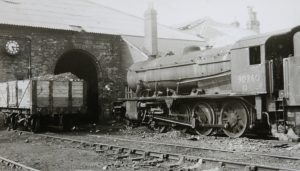
Yes, the voting system is against them but even so it’s interesting that in the face of disillusionment with a Labour Party seen as ‘not for us’, people opted for the Tories in Hartlepool and many local councils.
So let’s unpick the idea that Labour ‘isn’t for us’ up North a bit more. We are talking about those parts of the North which historically have strongly supported Labour – the Boltons, Oldhams, Blackburns over on this side and the likes of Huddersfield, Bradford, Halifax, Rotherham over on t’other. Hartlepool, Sunderland (where the LibDems made gains), Middlesbrough. Not Manchester nor Leeds where Labour wins support from the middle-class professionals but beyond them too; and results in Sheffield point to a very different political tradition emerging with the Greens doing very well.
So, going back to the lessons from Wales.
Labour could rebuild in the North if it was able to build an identity around class, community and region. Class in the sense that it has to show it is representative of the communities it is part of and speaks their language and understands the issues – including the paramount issue of jobs. Community in that it brings people together and champions local issues and concerns – whether it’s local bus services, developing ‘green spaces’, supporting local culture and heritage or fighting inappropriate development. Region in that it is part of the North, in the way that Labour in Wales has promoted itself as being Welsh but a very inclusive Welshness. Labour in the North of England needs to rebuild its trust with the ‘white’ working class but not ignore its support amongst BAME communities and amongst middle-class professionals. A shared, inclusive, Northern identity can help do that. A shared ‘Northernness’ brings people together. Not in any ‘anti-South’ sense but through pride in our heritage and our present-day identity. Welsh Labour and also the SNP have been able to construct a ‘civic nationalism’ that is inclusive and generous. Labour could do the same for a civic regionalism.
This is about more than a bit of clever marketing. Just as Labour in Wales and Scotland have become effectively their own distinct political parties within an overarching UK Labour, we should have our own devolved ‘Northern Labour’ with its own domestic regional policies which include democratic devolution (based on an extension of the Greater Manchester and Merseyside mayoral system with an elected membership and covering a broader geographical area to create ‘Greater Lancastria’). I’ll expand this further later but Greater Manchester has never been the right size: it should be expanded to include all of Lancashire and create a strong region with empowered local authorities within it.
If we continue having to take orders from the London-based Labour HQ, including having candidates as well as policies foisted on us, people will carry on rejecting us. There have been suggestions that Starmer might move Labour Party HQ out of London, which wouldn’t be a bad thing (rents are very cheap in Farnworth if Keir wants to have a look at the grand – and largely empty – former town hall) but it doesn’t really address the issue.
Does this mean all parts of England should have their own ‘regionalised’ Labour parties? If that’s what the party membership wants, why not? London Labour makes obvious sense and something like it already exists organisationally (www.londonlabour.org.uk), but the same could work for the Midlands, South-west and eastern England.
If Starmer and the Labour leadership really want to look at radical solutions, they need to do that most difficult thing for politicians to do – surrender power. A ‘Northern Labour’ wouldn’t be deciding foreign policy, like whether to invade France or have its own air force. But there are lots of domestic policies that a ‘Northern Region’ within the UK could have responsibility for, and we need look no further than Wales to see how that could work (and Scotland too, of course).
A Northern Railway, accountable to a Northern government? Yes please!
The political expression of Northern devolution must be a devolved political party. It can’t be done by policy wonks in London.
Would ‘Northern Labour’ stem the decline of Labour in the so-called ‘red wall’ seats? Yes, I’m sure it would.
My book REGION: CLASS: COMMUNITY: Socialism with a Northern Accent will be out in July, published by Lancashire Loominary www.lancashireloominary.co.uk
Rise of the hyper-locals
A neglected aspect of the election results in the North has been the very strong showing of what have become known as the ‘hyper-local’ parties. I’ve written about them in previous Salvoes, particularly the inexorable rise of Farnworth and Kearsley First, but it has spread to many other ‘middling’ towns including Radcliffe (Bury), Horwich and Westhoughton (Bury) and Failsworth (Oldham). What these have in
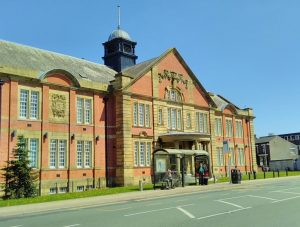
common is a common industrial heritage – primarily textiles but engineering and mining in some cases. All of which has gone. In addition, crucially, they all once had their own strong local government which was swept away in 1974 by local government reform. Some kept parish/town councils, others just merged into large metropolitan districts. Labour has never liked parish councils and so Farnworth lost its once-proud and progressive local authority to be merged with big brother Bolton. It went into a steady decline, with industrial wipe-out, loss of its municipal voice and the inevitable rise of drugs and anti-social behaviour.
Farnworth and Kearsley First now has five councillors on Bolton Council, covering two wards. I’m not close enough to them to know whether they will now push for their own town council, but I hope they will. Radcliffe First, only formed a few months ago, immediately won two council seats. So did Failsworth whose ‘Failsworth Independent party’ unseated the incumbent council leader.
In many ways these results are every bit as significant as Hartlepool. And I would put money on many people voting ‘hyper-local’ in Farnworth, Radcliffe and Failsworth voted for Labour’s Andy Burnham in the mayoral election. Shifts in the composition of metropolitan councils like Bolton, Bury and Oldham take time as only one seat is up for election each year. So the rise of the ‘hyper-locals’ is far from complete. In councils like Bolton, for now the larger parties – Conservatives in this case – are dependent on the hyper-locals for survival.
The Dignity of Labour
Jon Cruddas is one of the more thoughtful members of parliament. He represents Dagenham constituency in east London. His book The Dignity of Labour is a fascianting engagement with the nature of work in the 21st century and how Labour should respond to the huge changes that have taken place since the days that Ford’s Dagenham employed thousands of workers.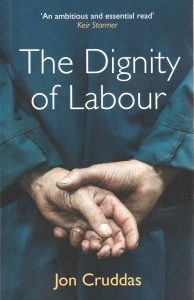 ‘Dagenham’ summed up the modern ‘Fordist’ economy and the politics that flowd from it – huge concentrations of highly organised workers whose politics would be usually Labour.That world has gone but it’s too easy, as Cruddas argues, to say goodye to the working class, or even ‘work’ itself and put all your political eggs in the basket of the new ‘networked young professionals’. As events of the last few days have shown, the working class is still with us and Labour has paid the price of assuming ‘they’ll always vote for us’. That hasn’t been the case for quite a while but consciousness usually lags far behind reality.
‘Dagenham’ summed up the modern ‘Fordist’ economy and the politics that flowd from it – huge concentrations of highly organised workers whose politics would be usually Labour.That world has gone but it’s too easy, as Cruddas argues, to say goodye to the working class, or even ‘work’ itself and put all your political eggs in the basket of the new ‘networked young professionals’. As events of the last few days have shown, the working class is still with us and Labour has paid the price of assuming ‘they’ll always vote for us’. That hasn’t been the case for quite a while but consciousness usually lags far behind reality.
Cruddas doesn’t offer simple remedies and parts of his book are an interesting theoretical encounter with Marxism and Catholic Social Teaching, which Maurice Glasman’s ‘Blue Labour’ tendency has done much to promote. A central message is that work must be not only well paid but meaningful; something that the workers can take pride in. This has echoes of some aspects of Buddhism where it teaches that the most seemingly ‘menial’ job should be treated with dignity, pride and a sense of spirituality.
The Dignity of Labour is published by Polity Press and is available in paperback
Allen Clarke book out soon
He was friends with Keir Hardie, corresponded with Tolstoy and met Thomas Hardy. He was loved by tens of thousands of Lancashire mill workers and had a bewildering output of novels, sketches in Lancashire dialect and works of philosophy. Yet today Allen Clarke is little known, even in his native county. 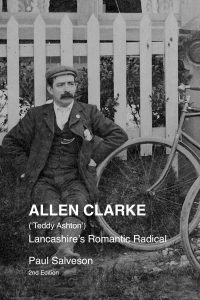 My book on him – Lancashire’s Romantic Radical – the life and writings of Allen Clarke/Teddy Ashton was published in 2009. For various reasons it wasn’t an ideal time to launch a book but I have managed to shift 500 copies. It’s time for a new edition. Here is a bit about him…
My book on him – Lancashire’s Romantic Radical – the life and writings of Allen Clarke/Teddy Ashton was published in 2009. For various reasons it wasn’t an ideal time to launch a book but I have managed to shift 500 copies. It’s time for a new edition. Here is a bit about him…
I first discovered Allen Clarke when I was a student at Lancaster in the 1970s. Mooching about in the university library I came across a collection of dialect sketches set in my home town, Bolton. They were funny, perceptive and politically incisive. The author was ‘Teddy Ashton’ whom, it turned out, was a writer called Allen Clarke. It began a close life-long friendship, though we have yet to meet. Clarke was born in Bolton on February 27th 1863. He became one of the North’s most popular dialect writers, following in the footsteps of Edwin Waugh, Ben Brierley and Samuel Laycock, a generation later. He was at his peak between the mid-1890s and late 1920s, with thousands of devoted readers amongst the mill workers of Lancashire and Yorkshire.
He was best known by his ‘Teddy Ashton’ pen-name which he used for his ‘Tum Fowt Sketches’ set in ‘Tum Fowt’ (or ‘Tonge Fold’) just outside Bolton. He was, in the broadest sense, a ‘libertarian socialist’. He was friends with Tolstoy and tried to set up a co-operative community near Blackpool in 1903-5. His writings did much to turn public opinion against child labour. In the 1890s the ‘half-time’ system was still in general operation across Lancashire, with working class kids going to work in the mill at 6 a.m. then school in the afternoon.
He had complex spiritual interests – he helped to popularise eastern philosophy in his newspapers and in books such as What is Man? and The Meaning of Life. He was a spiritualist; his book The Eternal Question is probably the best statement of his religious beliefs. Running through all his work is his passion for Lancashire, and cycling.
The new edition of my book is a) significantly enlarged with a new chapter on his railway writings b) properly referenced and c) has an index. Maybe there’s a d) as well – hopefully most of the typos have been removed. The book is at the printers – Minerva Press, Bolton. The same firm which printed Moorlands, Memories and Reflections last year, so they’ll do a good job. It should be ready in May and I’m hoping to keep the price around £15. There will be a pre-publication offer for Salvo readers.
Looking back on our history: Life in the Tannery
My dad worked for most of his life at Walker’s Tannery – my most recent piece in The Bolton News’ ‘Looking Back’ pages features the history of this very smelly place. One of the great things about researching the piece was coming across lots of people with memories of the ‘The Tanner’ – people who worked there, or whose mums, dads, grans and grandfathers worked there. I’d very much like to develop the material and maybe get a book out about this fascinating company and local industry.
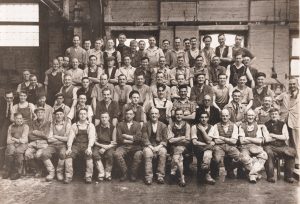
It was very much a Bolton-based firm and the Walkers saw themselves as creating an industrial ‘family’. It was a form of social partnership, with a decent company pension, benevolent fund and a social club. I was one of the hundreds of kids who went along to the Christmas parties in the Welfare Centre, built after the war. Alongside the paternalism was a hard, dangerous environment with not particularly good pay. The entire place went in the late 1970s and only a hint of the smell still remains.
https://www.theboltonnews.co.uk/news/19289137.walkers-tannery-brought-prosperity-smell-bolton/
Illuminating books from the Lancashire Loominary
I mentioned other books in the pipeline, so here goes. After Allen Clarke I’m bringing out a new edition of my Walt Whitman (With Walt Whitman in Bolton: spirituality, sex and socialism in a Northern Mill-town) book which includes a new section on ‘Walt Whitman and Socialism in the North of England’. It effectively doubles the size of the original which despite having gone through four editions hasn’t changed much
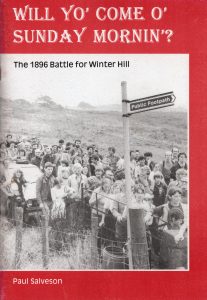
since I did the first one in 1984. This will be a significant change and hopefully improvement. Again, it’s well referenced and has an index, keeps most of the illustrations and adds a lot of new material. It includes a piece by Stuart Murray on the more recent history of the Bolton-Whitman connection, mostly the annual Whitman Walk. The new book will probably be called Unlikely Pioneers: Walt Whitman and Northern Socialism 1885-2021. I’m aiming to have it out for the summer, sadly missing Whitman Day on May 31st.
After that, I’m bringing out a new edition of Socialism with a Northern Accent. The original was published in 2012 and the world has moved on, even in the last few days. The early history of socialism in the North of England is all still valid but I’ve added new material and brought the story up to date. There will be a lot more on politics in the North today and prospects for a radical Northern political revival that can challenge the Tories. That should be out in September, maybe sooner.
I’m thinking about a completely new book which incorporates bits of Northern Rail Heritage(2009) and Railpolitik (2011) into a new production called, provisionally: Lines of Distinction: Railways of North-West England. Volume 2 would cover Yorkshire and the North-east. Alongside all those, I am toying with a new novel. More on that soon.
Books in print or kindle
The main sales items at the moment are my book celebrating the West Pennine Moors – Moorlands, Memories and Reflections and a sudden rush of interest in my novel (set in Horwich Loco Works) The Works. This 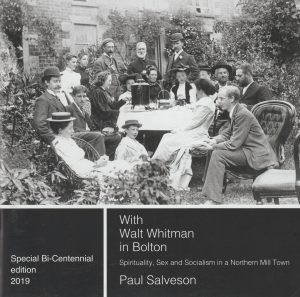 could be related to the special offer of £6 while stocks last. The ‘Bolton – Lancashire’ face mask is now sold out and has raised about £500 for local charities. I’m also doing a half-price offer on the current With Walt Whitman in Bolton, for £5.
could be related to the special offer of £6 while stocks last. The ‘Bolton – Lancashire’ face mask is now sold out and has raised about £500 for local charities. I’m also doing a half-price offer on the current With Walt Whitman in Bolton, for £5.
I’m in the process of putting books onto kindle (well, Simon is on my behalf, far too complicated for me). The life and work of Allen Clarke/Teddy Ashton – Lancashire’s Romantic Radical (see above) – will be going on the kindle list, as well as With Walt Whitman in Bolton – which may help sales in America.
Full details of all publications are on my website here (or see summary below): www.lancashireloominary.co.uk or email me for details at info@lancashireloominary.co.uk
Second-Hand Department
The Lancashire Loominary Secondhand Bookshop has stirred a bit of interest. There’s still some quite good stuff there – you can view it at http://lancashireloominary.co.uk/index.html/second-hand-books . I’ve added a few more things to it and I’m happy to consider swops for interesting books on Lancashire, politics, railways etc.
My photo gallery – an emphasis on steam (but not completely)
I’ve been making some changes to my website/s…I’m keeping www.lancashireloominary.co.uk for all publications, including The Salvo. However, www.paulsalveson.org.uk has been re-born as Paul Salveson Photography: places, trains and factories or summat like that.
There are several pages dealing with different aspects of my photography: BR Steam, Continental Steam, The Modern Railway, Industrial Steam, Northern Rural Landscapes, Mills and Mines, and Strikes, Riots and Demonstrations. This is my current favourite: Industrial Railways UK 1966 – 1980 – Paul Salveson Photography
Good places to buy my books and other things
As lockdown starts to ease, more shops will be opening in the next few weeks which sell my books. These include Carnforth Bookshop, Wrights’ Reads in Horwich, Pendle Heritage Centre in Barrowford and Kelsall’s in Littleborough. Please support your local bookshops, it’s vital they survive.
A great feature of any walk up Rivington Pike is the Pike Snack Shack on George’s Lane – a long way up, the last place before you get on the track to the summit. They do coffee, pies, sandwiches and cakes for takeaway and you can sit amidst the heather and savour the view across the West Lancashire Plain. You can also buy copies of Moorlands, Memories and Reflections. Another popular addition to my list of retail outlets is Bunbury’s real ale shop at 397 Chorley Old Road, Bolton. The bar side of the business is currently shut but they are open for takeaway. I can recommend their oatmeal stout and some superb German lager. Another slightly unconventional outlet is A Small Good Thing, on Church Road. This is a great little shop mainly selling organic fruit and veg and a range of ‘small good things’. Fletcher’s Newsagents on Markland Hill Bolton are stockists. Justicia Fair Trade Shop on Knowsley Street, Bolton, is handy for the town centre and has a full set of my books available (and some great gifts from around the world, ethically sourced).
Winter Hill 125 – this September, join us for a walk o’er Winter Hill
Plans to celebrate the 125th anniversary of the 1896 Winter Hill ‘mass trespass’ continue to evolve with strong interest from The Woodland Trust, local unions, The Ramblers and many more groups and individuals. The celebration will take place on Sunday September 5th 2021 – get it in your diary now! My book on the mass trespass is available price £5 (plus postage if not local) – see below. It is hoped to have some major events this year, circumstances permitting. More details to follow. The best way of keeping updated is to join the Winter Hill 125 facebook page. The zoom conference on march 12th went very well – though we were over-subscribed with 170 people registered. We could only allow in 100! However, it is now available on youtube, take a look: https://www.youtube.com/watch?v=OdDUgiWz1lg
Small Salvoes
- The January 7th issue of the London Review of Books contains reference to Green Lane Bridge, Bolton. This was where I did much of my early trainspotting, a few years later than Ian Jack, who wrote the article – about ‘the Railway Hobby’. It’s worth looking at if you can download it. The subsequent correspondence was also interesting, with some readers mentioning the relatively modern
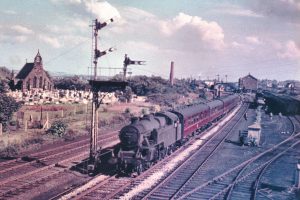
The ‘Hellifield Flyer’ taken from Green Lane Bridge c 1961 by Steve Leyland practice of ‘bashing’ (as opposed to gricing). I suspect it’s a much bigger and more complex world than Ian imagines, or feared. I can remember many years ago reading a fascinating article called ‘Revolutionary Politics as a Hobby’ which used railway enthusiasm as a comparator to far-left political activity. Slightly worrying. Still I wonder how many other trainspotting haunts have made it into the London Review of Books, or Vogue, whose editor is supposed to be a bit of a crank? (there’s another description and one that I rejoice in).
- Bolton Food and Drink festival will happen this year, over the August Bank Holiday. Bolton Station will hold its ‘Mela’ on the same weekend with a wide range of food and music.
- Poetry from the Platform is selling well and you can buy it via pay pal on the CRP website. Details here: https://www.boltoncommunityrail.org.uk/2021/02/26/poetry-platform-for-boltons-creative-community/#more-307
……………………………………………………………………………………………………………..
Special Traffic Notices: Coming Events
Nothing specific as yet but a programme of steam specials starts in May including trains from Carnforth via Preston and Blackburn to Carlisle and the east coast.
……………………………………………………………………………………………………
The Salvo Publications List – see www.lancashireloominary.co.uk
The following are all available from The Salvo Publishing HQ, here at 109 Harpers Lane, Bolton BL1 6HU. Cheques should be made out to ‘Paul Salveson’ though you can send cash if you like but don’t expect any change. Bottles of whisky, old bound volumes of Railway Magazine, number-plates etc. by negotiation. If you are local you are welcome to call round and pick books up on the doorstep, or the Bolton Bicycling Bookshop can deliver to yours.
Moorlands, Memories and Reflections (2020) A hundred years ago Lancashire writer Allen Clarke published a forgotten masterpiece – Moorlands and Memories, sub-titled ‘rambles and rides in the fair places of Steam-Engine Land’. Clarke’s biographer, Professor Paul Salveson, has published a new book celebrating Clarke’s original and bringing the story of Lancashire’s moorland heritage up to date. Maxine Peake, in her foreword to Paul’s book, says “Hill walking, cycling, literature, philosophy, protest and The North…. these are a few of my favourite things.” She adds “Paul Salveson’s new book on Allen Clarke is irresistible.” Price £20 – see the website for details of how to buy: http://lancashireloominary.co.uk/index.html/order-form
The Works (2020). My first novel , set in Horwich and Bolton in the 1970s and 1980s but bringing the story up to the present and beyond. Much of the action takes place in Horwich Loco Works and the campaign to save it from closure. In real life, it closed down in 1983. In the novel, after a workers’ occupation it is run as a co-operative, building both steam for heritage railways and modern eco-friendly trains for the world market. Price £6 (special offer) . Also on Kindle £4.99.
Will Yo’ Come O’ Sunday Mornin’? The Winter Hill trespass of 1896 (1996). Quite a few copies have re-surfaced and are available price £5 – with all proceeds going to Bolton Socialist Club, which played the main part in organising the original demonstrations in 1896. This was Britain’s biggest-ever rights of way battle with a series of demonstrations which peaked at 12,000 one Sunday afternoon in September 1896.
Lancashire’s Romantic Radical – the life and writings of Allen Clarke/Teddy Ashton‘ (2009). The story of Lancashire’s errant genius – cyclist, philosopher, unsuccessful politician, amazingly popular dialect writer. This book outlines the life and writings of one of Lancashire’s most prolific – and interesting – writers. Allen Clarke (1863-1935) was the son of mill workers and began work in the mill himself at the age of 11. Currently out of print but new and enlarged edition out in May. There will be a pre-publication offer.
With Walt Whitman in Bolton – Lancashire’s Links to Walt Whitman This charts the remarkable story of Bolton’s long-lasting links to America’s great poet. Bolton’s links with the great American poet Walt Whitman make up one of the most fascinating footnotes in literary history. From the 1880s a small group of Boltonians began a correspondence with Whitman and two (John Johnston and J W Wallace) visited the poet in America. Special offer to end of April £5 plus postage if you’re not local. New and extended edition under preparation – should be out late May, in time for the annual ‘Whitman Day’
The Settle-Carlisle Railway (2019) published by Crowood and available in most bookshops price £24. It’s a general history of the railway, bringing it up to date. It includes a chapter on the author’s time as a goods guard on the line, when he was based at Blackburn in the 1970s. The book includes a guide to the line, from Leeds to Carlisle. Some previously-unused sources helped to give the book a stronger ‘social’ dimension, including the columns of the LMS staff magazine in the 1920s. ISBN 978-1-78500-637-1
You can get a better idea from going to my website: http://www.lancashireloominary.co.uk
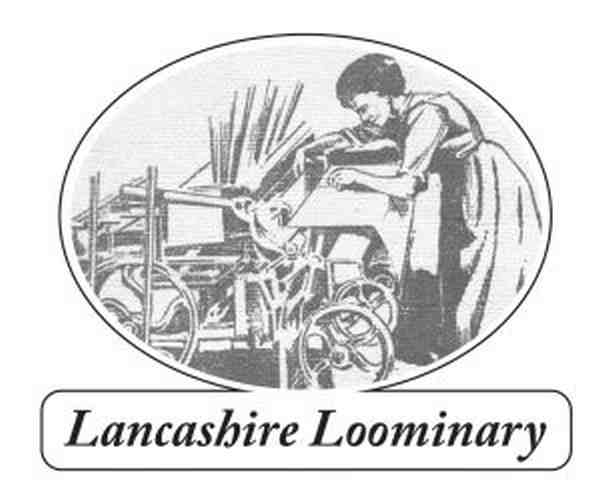
11 replies on “Northern Weekly Salvo 293”
It has been many years since there was an homogenous working class, so it seems perverse to insist on a one size fits all Labour Party. Regional versions of the national party seem the most likely way of reclaiming the trust of the many, who are bored with the few arguing semantics in their metropolitan elite.
PS I’m not sure that retaining deputy leadership of the party and a higher profile front bench role actually constitutes being sacked!
Paul,
You seem sceptical of the incumbency factor but perhaps it’s a case of Stockholm syndrome!
Bill
https://www.britannica.com/science/Stockholm-syndrome
I’ve read your comments with pleasure for several years and I’ve been grateful for your knowledge and insights. However I think it’s time now to part company. I was not hugely impressed by comments such as “a knee-jerk leftist position, scorning ‘Blairite’ Starmer” and “retreating to a comfortable Corbynite world”. I’m not sure what in the last Labour manifesto you objected to but it sounded OK to me. Meanwhile the planet is totally fucked and the poor are going to be even more fucked than they already are. And Boris Johnson, Kier Starmer and their pal Justin Welby are doing fuck all to stop that impending nightmare. http://www.click-to-save.org
Paul has a different view – so you don’t want to listen. Typical of people on the left who only want self reinforcing ideas and are unable to look at their own views critically, let alone anyone else’s. It is this attitude that has got the left into the position of irrelevancy it holds today. A total failure to engage with other people on the left with different ideas, let alone the wider population.
I have very much enjoyed reading through this publication. A fascinating and wide range of material. Well done.
Just a couple of points, one closely & the other vaguely related to the latest Salvo. Much has been said of Labour turning away from its working class support (Being contemptuous of Brexiters, London obsessed etc) but it’s also the case that the Labour voting working class are no longer there. De-industrialisation, decline in trade union membership, decline in council housing have all reduced the traditional working class size dramatically. What were the typical characteristics of a Labour voter – worked in heavy industry – often public sector, T U member, council tenant. It should be no surprise that Labour face problems. As long ago as 1981 Hobsbawm wrote ‘The Forward March of Labour Halted’.
And just to get off my chest. Recently 2 consecutive BBC programmes (Politics Live, The World at One) had guests (a Labour front-bencher & Sir Max Hastings) who described Boris Johnson as a ‘serial liar’. No-one batted an eye lid. I think that says it all.
Interesting to read your speculation from the North about where the Labour Party went wrong. Had you noticed that down here in the ‘European’ south the Conservative party has actually lost ground on some of the more high-profile Councils. In both Kent and West Sussex their vote was down and a number of seats changed hands, some to Labour. What’s with the Council of middle-class Worthing gaining Labour members. Unheard-of!
Some political speculation in this area (and in this weeks Economist) is that perhaps we hear too much about the ‘Deprived North’. Generally in this world you reap what you sow! Many around this region see that London and the SE is, like it or not, the powerhouse of the UK economy (London alone generates over 30% of our GDP), and to some extent it already subsidses the rest of the country. However, we are now seeing a lot of necessary investment in our local infrastructure, necessary to keep our buoyant economy working, going into Boris’s potential ‘Northern Blackholes’ as vote catching fodder. Little of his reallocated money would have migrated past Birmingham if conventional economic benefit/cost rules had been applied. Like it or not the European ‘Golden Triangle’ is still based on London/Paris/Frankfurt. For many down hers Boris’ Brexit was seen as selling us out, and perhaps now the forgotten remainers are starting to use their votes. Remember, in practice only 37% of the electorate went with Farage and Johnson’s blatant lies, and now these con-artists chickens are heading home to roost.
Yes, another view, but perhaps a more realistic one that is simply trying to move the Treasury to Darlington – or perhaps even Labour HQ to Farnworth!
I await hellfire and damnation from t’north!
I don’t usually find myself moved to write a comment when I disagree with what you say, but I feel I have to when I read your continued dismissal of the Greater Manchester concept in favour of something which seems based on Lancashire. What happened to north Cheshire, which is very much tributary to Greater Manchester? They do not have any affinity with Lancashire. There is justification for a Greater Manchester City Region, not ‘ Greater Lancastria.’ Greater Manchester ‘s problem has always been that its boundary to has been drawn too narrowly. In 1974 it should have included Wilmslow, Alderley Edge and Poynton /Woodford, save for the vociferous campaign to exclude them. Now the commuting area extends even further to places like Congleton.
Not in this issue but the previous one, you appear to have our fallen into the trap of dismissing HS2 on the basis of time savings. The real justification is release of capacity for freight, vital for contributing to carbon reduction targets, and for local passenger trains. Neither of these can gain more than access at present because of the paths taken up by long distance trains.
As always, lots of rich stuff. I have been up in Crinan, where my Oxford/ Open Uni. friend Anne Laurence motors me about, while I finish IRN ROAD, a Bradshaw-style survey of world railways boiled down to 250 A5 pages, and showing much progress – especially with Trumpoturd dislodged by ‘Amtrak Joe’ Biden. Back to Tuebingen soon – I hope, where work goes ahead on the Alb-Neckar Stadtbahn, including a Tuebingen town tram! Alison and her partner Nathan are due up. I have been studying the Baltic and Denmark where rail tunnel links have been prominent, and think of such projects linking Wales, Ireland and Scotland, as an ‘alternative Britain’. A remarkable Scot Thomas Drummond originated the 5’3″ gauge as Permanent Secretary in pre-Famine Ireland but died young, yet ambitious Irish plans are now considering hi-speed regional lines and metros which could use s.g. connections to create a low-carbon ‘alternative Britain’.
Thanks for your thought provoking analysis, as usual. The counterposing of articles in this edition reveals. however, your yet unresolved ‘schizophrenia’ in promoting the ideals of ethical socialism/anarchism in the Morris/Carpenter/Clarke tradition while fostering illusions in the Labour Party. Picking over the remains of a corpse may be gruesomly fascinating but it tells us nothing about life. The real existential issues of the increasingly dehumanising impact of technology and its impact on the very basis of life on earth doesn’t get a look in – although this is fundamental to the concerns of ethical socialism. The ethical, aesthetical and anti-technological values of the pioneers need salvaging (Salvoging?) from the crude materialism that is the basis of both social democracy and orthodox Marxism. This will produce no short term electoralist advantage, but it will provide the only foundation on which a real transformation of society can be built. The Labour Party is finished. There is no left electoral alternative. What is needed is a Movement that links people in their struggles to engage people in real ldemocracy at a grass roots level. Such a movement also needs to be built not on abstract class interests but on real human relationships – on Fellowship – and on the concept of socialism/anarchism as a means not just to create a new social system, but better individuals. That has to be prefigurative, it has to take place now, not be relegated to ‘after the revolution’. The sordid world of party politics can not prefigure a new world. It can only perpetuate the values and behaviour of the old. I hope that your new edition of ‘…with a Northern accent.’ draws the contrast between the cooperative, mutualist and ethical values of the pioneers of the coops and the trade unions and non-party radicalism with the moral cesspit that is the modern Labour Party and Trade Union bureaucracy – not sparing the various Bolshevik derived sectlets that help sustain it, of course.
Great read as ever Paul – thank you and keep it going.